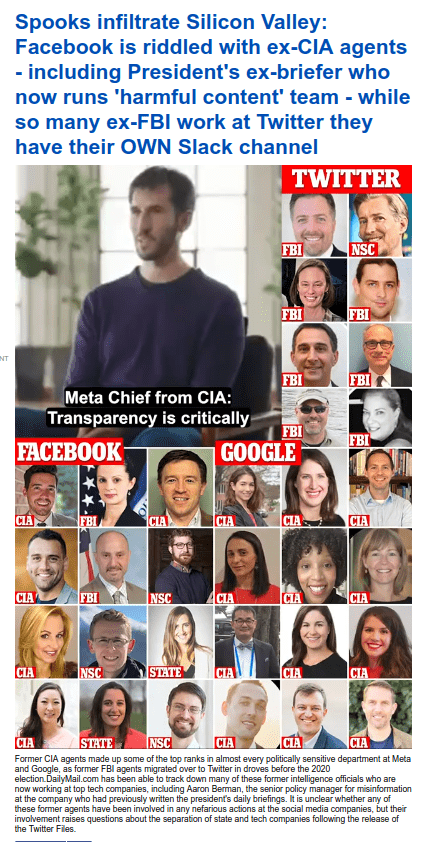Internet Censorship in US and Europe Is Coordinated
Via The Daily Bell
The EU Is Warning American Tech Giants to Crack Down on Hate Speech Now … “They will have to act quickly and make a strong effort in the coming months.” U.S. tech giants including Facebook, Twitter, Google’s YouTube and Microsoft will have to act faster to tackle online hate speech or face laws forcing them to do so, the European Commission said on Sunday. -Reuters
Western governments are censoring speech in Europe and the US, an obvious pattern that clearly shows coordination.
In the US, there is a congressional effort to fund intel agencies that will investigate alternative media for ties to Russian propaganda. Such investigations , if they occur, will retard this sector and make further, free-reporting difficult.
In Europe, efforts to control speech and reporting are actually being aimed at American communication enterprises such as Google, YouTube and Microsoft (see excerpt above).
More:
The European Union (EU) executive’s warning comes six months after the companies signed up to a voluntary code of conduct to take action in Europe within 24 hours, following rising concerns triggered by the refugee crisis and terror attacks.
This included removing or disabling access to the content if necessary, better cooperation with civil society organizations and the promotion of “counter-narratives” to hate speech.
The code of conduct is largely a continuation of efforts that the companies already take to counter hate speech on their websites, such as developing tools for people to report hateful content and training staff to handle such requests.
Top powers in the US and Europe will not likely admit coordination to crack down on Internet news and views but this is obviously what’s happening.
It is true that European censorship justifications have a longer history. Complaints about terrorism and hate speech have been voiced for several years. In the US, the sudden emergence of concern over Russian influence on ‘Net-based media is a new phenomenon.
Nonetheless, the House has just passed a bill to fund investigations into Russian influence on American media (see here). Such investigations might involve the tracking of so-called Alt.right “hate speech” as well.
Western efforts to “control” the Internet will no doubt adopt certain Chinese solutions over time. In China the Internet is actively being used as an agency of repression. Citizens are to receive ‘Net-based “grades” based on docility and how well they obey laws and generally fit in.
The larger question as governments crack down on ‘Net-based speech is whether or not people’s awareness of what is actually going on in their societies will transcend censorship.
History seems to show that after the Gutenberg Press launched an explosion of new ideas in printed form it took Western governments (and the controllers behind them) many centuries to regain control – 400 or 500 years as a matter of fact.
Western governments face similar problems now. A whole generation of individuals has absorbed a new way of thinking promulgated by the ‘Net. This is one reason approval of mainstream media is in the single digits while up to 50 percent or more (in the US, anyway) admit to belief in “conspiracy theories” – versions of important events not dictated by government and secret forces operating behind government.
In aggregate these views posit a different society than the current one. Today’s society is an outgrowth of World War II reorganization and depends heavily on the dictates of massive governments and even larger corporate enterprises.
‘Net-based alternative sociopolitical organization tends to criticize such titanic social solutions and is often more libertarian based. The idea is that culture ought to dictate social organization and economic, political and even military control ought to be organized from the ground up instead of top down.
These two models are on a collision course. Despite the intention of elites to wipe out the emergence of alternate thinking regarding social control, the insights that have been re-established via Internet communication are not going to easily or rapidly dissipate. In fact, censorship will likely reinforce their validity and emphasize their credibility.
A whole different world view is now part of people’s consciousness, certainly in the West and likely elsewhere too, even China. Such alternative insights about money, power and politics are extraordinarily difficult to eradicate. Ideas of freedom, local authority and individual responsibility are not easily stamped out once they have gained – or regained – credence.
In this case, the Western intelligentsia has been reawakened en masse to an alternative cultural model that has its roots in thousands of years of practice and application. These cultural solutions stand clearly in opposition to the current sociopolitical formula that emphasizes bigness and technocratic authoritarianism.
Anti-war, pro-individual freedom, private money and private justice, these precepts have found their way into intellectual circulation once more. They are extraordinarily compelling and will continue to have an influence far beyond what is easily apparent.
As this article was being posted, ZeroHedge reported that Naked Capitalism’s Yves Smith threatened The Washington Post with a defamation suit and demanded a retraction for reporting that the website was in league with Russian interests. We’re actually surprised a class action lawsuit hasn’t been launched as numerous websites have been smeared by these accusations. Could such a lawsuit be aimed at Congress as well (despite sovereign immunity)?
Conclusion: History may well repeat in the 21st century, but not necessarily in ways current elites are hoping.
Fake news” is a mainstream media hoax to control their narrative
They’re losing control of their narrative, and this is their last ditch attempt to fight back.
Don’t get me wrong, there’s plenty of fake news around. There are articles about everything under the sun either causing or curing cancer, and completely misleading clickbait stories that are entirely devoid of substance or content. Worst of all, there are endless fake opinion articles across the mainstream media, that are simply the same talking points repeated again and again. Public opinion can be controlled this way, as we’ll show you in this article, and this shows the danger of using a term like “fake news” to describe all these things and more.
The real issue isn’t fake news, it’s fast food news, thoughtless articles for thoughtless consumption. This “news”, that was picked up by plenty of sites on the left, chides the president-elect for “impulsively” responding to SNL making fun of him, by saying that it’s unwatchable. There’s no real story here, besides that Trump thinks SNL is unwatchable, but all the different sites go on to complain about him being impulsive about his tweeting. Articles like this have been the basis of the left’s attacks on Trump, and liberal attacks against conservatives around the world. Someone says something innocent, and as one, different media outlets pick it up, attributing the quote to some glaring character flaw in that person. In Trump’s case, they’ve been repeatedly using Twitter quotes to paint him as impulsive and dangerous, among other things.

Creating news by repeating the same talking points is a common trick used by the mainstream media. Noam Chomsky does a great job of describing it in his book “Manufacturing Consent”. The most terrifying example of the media making up news is the leadup to the Iraq war in 2003. As the government alleged that Iraq trained terrorists and had WMDs, the media did not investigate, they repeated. Everyone was pro war, and it was taboo to question the narrative. As a result, hundreds of thousands died, and ISIS rose to power in the region.
This documentary shows how this happened, and it might give you a glimpse of how dangerous this trend of calling things that go against the narrative “fake news” is. With the rise of the internet and news happening on social media, cable news networks suddenly faced opposition from alternative outlets like Breitbart, Infowars, and smaller blogs like this one. To control this opposition, these outlets and their stories need to be trivialized. The term “fake news” is perfect for that. You don’t have to bring up arguments or use logic to convince people, you can just cry “fake news!”.
This is already being used in the Pizzagate investigation, that seems to be on the heels of something very sinister in Washington DC, a group of people using known pedophile code language in the highest circles of government. Instead of investigating the claims, Pizzagate is branded fake news, and dismissed out of hand. This tactic can be used against anything going against the wishes of those in control of the mainstream media, and that gives them the power to completely control the narrative. As the Iraq war fiasco taught us, the mainstream media can’t be trusted with this control.
Don’t trust anyone crying out fake news without looking at their claims and the alleged fake news itself. Don’t be controlled by sites like this one, using armies of twitter bots to spread their empty articles. Fake news is anything that isn’t backed up by evidence or reason, and that’s something you can only judge for yourself.




